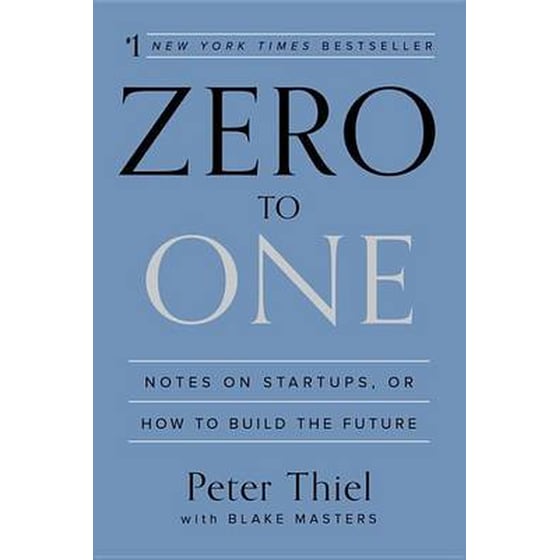"Zero to One" by Peter Thiel
A Roadmap to Innovation and Success

"Zero to One: Notes on Startups, or How to Build the Future," co-authored by Peter Thiel and Blake Masters, is a seminal book that explores the principles of innovation and entrepreneurship. Published in 2014, this book is based on Thiel's lectures at Stanford University and provides a unique perspective on creating value in the modern world. As a co-founder of PayPal and an early investor in Facebook, Thiel's insights are grounded in his extensive experience in the tech industry. "Zero to One" challenges conventional wisdom and offers a fresh approach to building successful startups.
Key Concepts in "Zero to One"
1. Vertical vs. Horizontal Progress
Thiel differentiates between two types of progress: vertical (zero to one) and horizontal (one to n). Horizontal progress refers to copying and improving existing ideas, while vertical progress involves creating something entirely new. Thiel argues that true innovation comes from vertical progress, which moves society forward by creating groundbreaking products and technologies.
2. Monopoly vs. Competition
Contrary to popular belief, Thiel asserts that monopolies, rather than competitive markets, drive progress and innovation. He argues that monopolies can afford to think long-term and invest in research and development, whereas companies in highly competitive markets are often focused on short-term survival. Successful startups should aim to create a monopoly by offering a unique product or service that dominates a niche market.
3. The Power of Secrets
Thiel emphasizes the importance of secrets—unknown truths that can be discovered and exploited. He encourages entrepreneurs to seek out and capitalize on secrets, as they can lead to significant competitive advantages. According to Thiel, the most valuable companies are built on secrets that others either don't see or choose to ignore.
4. The Importance of a Strong Foundation
A key theme in "Zero to One" is the importance of laying a strong foundation for a startup. Thiel advises entrepreneurs to carefully choose their co-founders, build a solid team, and establish a clear company mission. He also stresses the need for startups to develop a robust business model that can scale and sustain long-term growth.
5. Last Mover Advantage
Thiel introduces the concept of the "last mover advantage," which is the idea that being the last significant player in a market can be more advantageous than being the first. By creating a lasting monopoly, a company can reap the rewards of sustained market dominance. This contrasts with the traditional notion of the "first mover advantage," which suggests that being the first to market is the key to success.
Lessons for Entrepreneurs
1. Focus on Unique Value
Entrepreneurs should aim to create products or services that offer unique value and cannot be easily replicated. By focusing on innovation and differentiation, startups can avoid the pitfalls of intense competition and carve out a niche market.
2. Think Long-Term
Thiel encourages entrepreneurs to adopt a long-term perspective and prioritize sustainable growth over short-term gains. Building a successful startup requires patience, persistence, and a willingness to invest in the future.
3. Cultivate a Culture of Innovation
Creating a culture that fosters creativity and innovation is crucial for startup success. Thiel advises entrepreneurs to surround themselves with talented individuals who share their vision and are committed to pushing the boundaries of what is possible.
4. Embrace Risk and Uncertainty
Thiel acknowledges that starting a business involves significant risk and uncertainty. However, he argues that the potential rewards of innovation far outweigh the risks. Entrepreneurs should be willing to take bold risks and embrace the unknown in their pursuit of breakthrough ideas.
5. Learn from Failure
Failure is an inevitable part of the entrepreneurial journey. Thiel encourages entrepreneurs to learn from their mistakes and view failure as an opportunity for growth and improvement. By analyzing and understanding their failures, entrepreneurs can develop better strategies and increase their chances of success.
"Zero to One" by Peter Thiel offers a thought-provoking and insightful perspective on innovation, entrepreneurship, and building the future. Thiel's unique approach challenges conventional wisdom and provides valuable lessons for aspiring entrepreneurs. By focusing on vertical progress, aiming for monopoly, and embracing the power of secrets, startups can create lasting value and drive significant change in the world. Whether you are an experienced entrepreneur or just starting your journey, "Zero to One" is an essential read that will inspire and guide you toward success.
Thank you!
_________________________________
Your most valuable asset is your time. Invest him properly!
DYOR
Not your keys, Not your crypto!
Find useful articles to read: HERE
My referal links:


![[ℕ𝕖𝕧𝕖𝕣] 𝕊𝕖𝕝𝕝 𝕐𝕠𝕦𝕣 𝔹𝕚𝕥𝕔𝕠𝕚𝕟 - 📈ALT season 40% vs No ALT season 60%📉](https://cdn.bulbapp.io/frontend/images/d2fb6be9-79f1-42ad-b3c2-b55996aa9941/1)










































